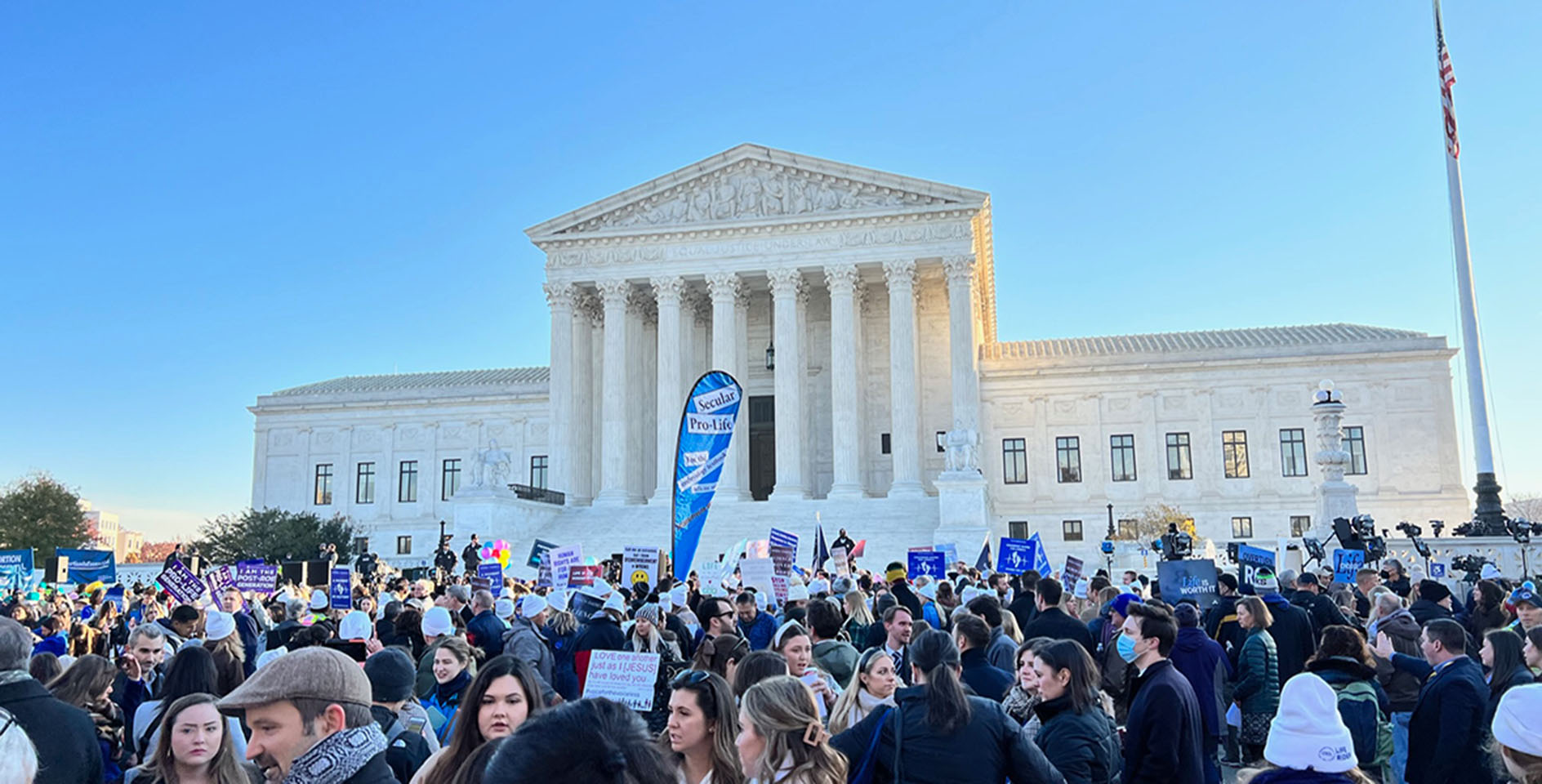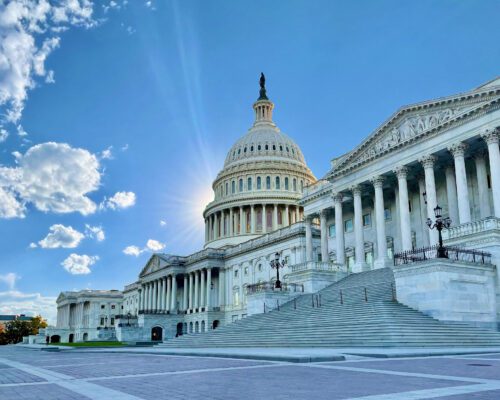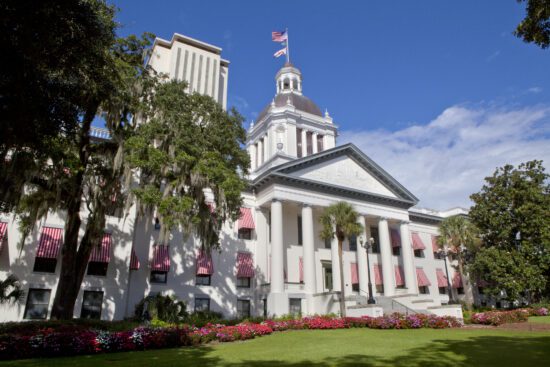Public policy advocacy is one of the many ways the ERLC fulfills its ministry in the public square. We recently released our 2022 Public Policy Agenda, which focuses on more than three dozen policy issues we will advocate before the U.S. Congress.
The Ethics and Religious Liberty Commission (ERLC) has been through a season of transition over the past year, but we have continued carrying out our ministry directive to serve the public policy interests of Southern Baptists, and we will always represent Southern Baptists before Congress, the courts, and the administration.
The second session of the 117th Congress is now underway, and it begins as the nation is still grappling with a global pandemic, supply chain issues, and economic uncertainty. This is a midterm election year, meaning that the window for legislative activity is shorter than usual, and — if history is any indication — the Congressional landscape will likely change in November.
In 2021, the Southern Baptist Convention was the first denomination to pass a resolution rightly calling what’s happening to the Uyghur people in China a genocide. Through advocacy efforts from the ERLC and like-minded partners, Congress passed and President Biden signed into law an important bill titled the “Uyghur Forced Labor Prevention Act.” Our advocacy against the genocide perpetrated against the Uyghur people will continue this year as we remain a voice for persecuted people. Additionally, in 2021, the U.S. Supreme Court heard oral arguments in a case titled Dobbs v. Jackson Women’s Health Organization. It is the most important pro-life case in a generation and could overturn the disasterous precedents set in prior cases like Roe v. Wade and Planned Parenthood v. Casey. We will work toward a day when abortion is unthinkable and unncessary.
Below is a sample of our policy priorities in the areas of sanctity of human life, religious liberty, family and marriage, justice, and international engagement. Some of these issues have been a part of the ERLC’s legislative agenda for the last several years; other issues are new and a product of the political moment in which we find ourselves.
Legislatively, both chambers of Congress are controlled by the Democratic Party during the second session of the 117th Congress, although with razor-thin margins. The Senate is divided 50-50 between the party caucuses, with Vice President Kamala Harris breaking any ties. In the House, the Democratic Party holds control by a handful of votes.
Although Senate Democrats will have some procedural tools to pass legislation on partisan lines, broadly speaking, only legislation with substantial bipartisan consensus will be able to pass both chambers and be signed by President Biden. It will therefore be difficult to pass certain legislation, but nevertheless, the ERLC will work to advance and make progress on our public policy agenda in these divided times at the federal level.
Religious Liberty
Defend Religious Freedom during the COVID-19 Pandemic: The ongoing pandemic has raised a number of religious freedom issues around our country. Public health orders have created thousands of potential areas of conflict, as local officials in communities individually respond to local conditions. The ERLC will continue to advocate that the government treat churches the same as similar activities, businesses, and spaces, while recognizing that First Amendment protections are not shed by churches during a health emergency. At the same time, we recognized that God has given the state the authority to manage activities, businesses, and spaces during a national health crisis.
To this end, the ERLC has produced a number of resources to equip churches as they work to understand the public health orders issued in their community and as they engage with local officials to advocate for their religious liberty rights. Additionally, as the Biden administration has issued sweeping mandates regarding the vaccines, we affirm the state must not use public health emergencies to overstep and exert authority that the Constitution has not entrusted it with.
Oppose the Equality Act: There are multiple pieces of legislation introduced in recent years which aim to, at the most extreme, codify the demands of the sexual revolution and radically reshape religious freedom in the United States. In February 2021, the House passed The Equality Act — a bill that would amend the 1964 Civil Rights Act to add sexual orientation and gender identity as protected classes under federal civil rights law. The bill would curtail religious freedom protections, hinder the work of healthcare professionals and faith-based hospitals, undermine civil rights protections for women and girls, and ultimately steamroll the consciences of millions of Americans.
The ERLC believes that this bill represents the most significant threat to religious liberty ever considered in the United States Congress. We will continue to lead efforts to oppose the Equality Act and any similar legislation introduced this Congress. As we do so, we will advocate for a public square solution that protects and upholds the dignity of all people and their rights, while ensuring that religiously motivated individuals and institutions are free to live and act according to their deeply held convictions.
Respond to Decision in Ramirez v. Collier: In September 2021, just hours before John Ramirez was to be executed for a murder in Corpus Christi, Texas, the Supreme Court granted a stay of the execution. Ramirez sued Texas prison officials for refusing to permit Dana Moore, pastor of Second Baptist Church in Corpus Christi, to minister to him during his execution. Ramirez requested that Moore be allowed to physically touch him and audibly pray in the execution chamber. The Supreme Court justices granted a stay of execution, fast-tracked his appeal, and heard oral arguments in November. The ERLC submitted an amicus brief in this important case, and we are hopeful that the court will rightly decide this case and allow inmates to have spiritual counsel and comfort in their final hours.
Sanctity of Human Life
Respond to the Decision in Dobbs v. Jackson Women’s Health Organization: In 2021, the Supreme Court heard oral arguments in Dobbs v. Jackson Women’s Health Organization, the most consequential abortion case in a generation. This summer the Supreme Court will issue its decision in that case, potentially overturning the disastrous decisions in Roe v. Wade and Planned Parenthood v. Casey and ultimately sending the issue of abortion back to the states. The ERLC joined an amicus brief in this case, asking the court to overturn those harmful precendents, and will work to ensure that abortion is unthinkable and unnecessary. We will work to ensure that states are equipped to respond if and when abortion is sent back to the states.
Protect Pro-life Riders in the Congressional Appropriations Process: Each year, as we carefully analyze Congress’s appropriations bills, we work to ensure that historic pro-life riders are maintained and included. Pro-life amendments have been attached to appropriations bills as “riders” for years. For over 40 years, the Hyde Amendment has protected American consciences and been recognized by each Congress as they passed it into law through the appropriations process. Last year, we saw the most serious threat yet to the Hyde Amendment, as the House abandoned its inclusion in the appropriations for the first time since it was enacted. An end to the Hyde Amendment is a major priority of groups that oppose our pro-life views. We will work to preserve the Hyde Amendment not only because it prevents government-funded violence against preborn children, but also because it prevents the government from coercing citizens to act against their consciences in the taxpayer incentivization of something we believe to be unjust.
Other pro-life amendments include the Weldon Amendment, protecting the consciences of healthcare workers from discrimination on the basis of their refusal to provide, pay for, or refer women for abortion. The Siljander Amendment prohibits U.S. funds from being used to lobby for or against abortion. We will seek to ensure that we don’t sacrifice other riders such as the Dornan Amendment, the Kemp-Kasten Amendment, the Dickey-Wicker Amendment, and the Helms Amendment at the expense of saving the Hyde Amendment. All of these pro-life riders are important and must be protected.
Prevent Proliferation of Chemical Abortions: Chemical abortion (sometimes referred to as a medication abortion or pharmaceutical abortion) is a method that uses an abortifacient to stimulate uterine contractions and end the pregnancy in a process similar to miscarriage. Between 2017 and 2018, chemical abortions increased by 9%. As surgical abortion procedures decline, chemical abortions rose, making up 41% of the total in 2018. The ERLC has asked the Food and Drug Administration (FDA) to categorize the abortion pill mifepristone, sold under the brand name Mifeprex, as an “imminent hazard to the public health.” However, the FDA in 2021 moved to increase access by permanently allowing these abortion pills to be delivered by mail. As it seems likely that the Supreme Court will rule to send the question of abortion rights to the states, efforts to restrict chemical abortions that threaten human life and dignity will increasingly be in the spotlight.
Family and Marriage
Support the Adoptee Citizenship Act: Prior to the Child Citizenship Act of 2000, the administrative steps required of families adopting internationally were unnecessarily burdensome. The process included applying for and moving through a lengthy naturalization process for their children, in addition to the lengthy and costly adoption process. The Child Citizenship Act of 2000 granted automatic citizenship to all foreign-born children brought to the United States who had at least one parent who was a U.S. citizen. Unfortunately, that act only applied to adoptees under the age of 18 when the bill was enacted, leaving an entire population of adopted children without full U.S. citizenship. The Adoptee Citizenship Act closes the loophole to provide immediate citizenship to these children already adopted by U.S. citizens yet left out of the previous bill.
Respond to the Opioid Crisis: According to the Centers for Disease Control and Prevention, opioids were involved in 49,860 deaths in 2019, accounting for over 70% of all drug overdose deaths that year. In 2020, drug overdose deaths in the U.S. rose by a staggering 31%. The drivers for this epidemic are complex, but the effects are simply tragic. Thankfully, the U.S. government took action, and Congress passed the largest bill in American history to address a single drug crisis — The SUPPORT for Patients and Community Act (H.R. 6). This bill was then signed into law by President Trump, marking a significant step forward in response to the opioid crisis. The legislation approved $6 billion in funding, curbed drug shipments, lifted treatment restrictions, expanded recovery centers, sped up new painkiller research, and made regulatory changes to Medicare and Medicaid.
We will continue to engage with congressional leadership and the Department of Health and Human Services on implementation of the SUPPORT Act and a range of efforts including poverty and welfare programs and training for the faith community. Along the bill’s path to passage, the ERLC engaged with members of Congress and the White House, as well as Sheriffs’ associations, medical professionals, and the faith community.
Ensure Intercountry Adoption Remains a Viable Option: In 2019, only 2,971 children were welcomed into families through intercountry adoption. The reasons for this decline vary, from certain countries completely halting their intercountry programs to other countries placing more children in homes domestically. There’s also been a decline in stateside adoption agencies facilitating intercountry adoption, narrowing the options for prospective parents. Many countries and cultures are becoming more open to domestic foster care and adoption. That is certainly good news, and ought to be encouraged. However, there are still millions of orphans worldwide who long to be raised in a family where they are known and loved instead of remaining a number in an impersonal institution.
Intercountry adoption must remain a viable option for welcoming those children into homes, and we must do all we can to facilitate those adoptions. In some countries, especially developing nations, the only chance a child might have at growing up in a safe, loving, permanent home is intercountry. The ERLC is working with like-minded partners and the U.S. Department of State to ensure that intercountry adoption remains a viable option for families and vulnerable children around the world.
Justice
Support a Permanent Solution for Dreamers: After multiple attempts to rescind the Deferred Action for Childhood Arrivals (DACA) program, followed by more than a year of litigation and a Supreme Court decision, those young immigrants who were brought to the United States by their parents remain in an unstable situation. These immigrants broke no law, and yet they remain without permanent legal status. Now young adults, these Dreamers — many of whom have families of their own with children who are U.S. citizens — are workers, students, and positive contributors to their communities. We will continue to work closely with Congress and the Biden administration to deliver a permanent legislative solution for Dreamers.
Support Further Criminal Justice Reform: Following on the heels of the historic First Step Act, which was passed at the end of 2018, the ERLC will continue to advocate for reforms that focus on transformation and rehabilitation. Two such bills are the Recognizing Education, Employment, New Skills, and Treatment to Enable Reintegration Act (RE-ENTER Act) and the Eliminating a Quantifiably Unjust Application of the Law Act (EQUAL Act). The RE-ENTER Act allows eligible individuals with federal convictions to apply for a certificate of rehabilitation from a district court, attesting to a law-abiding future and a commitment to successful reintegration into society.
Several states already issue such certificates, which have been proven successful in aiding recipients with employment and housing — two important factors necessary for successful reintegration. The EQUAL Act would remedy the disparity in federal sentencing for crack and powder cocaine related crimes. More than 40 states have already corrected this unjust, inconsistent practice. Both of these bills have broad bipartisan support, and the ERLC will continue to advocate for their swift passage.
Support Payday Lending Regulations: In November 2019, a bill titled the Veterans and Consumers Fair Credit Act was introduced in both the House and the Senate. The bill would extend the payday and car title 36% interest rate cap protections currently established under the Military Lending Act to all consumers, including veterans and their families. All Americans deserve such protection. In ongoing cooperation with the Faith for Just Lending Coalition, the ERLC was instrumental in advancing the repeal of the harmful “True Lender” rule last year and will continue to work for the regulation of an industry that has resulted in a devastatingly endless cycle of debt and despair for millions of Americans.
International Engagement
Advocate for a Strong Office of International Religious Freedom: The Office of International Religious Freedom at the Department of State is one of the most effective government institutions for protecting religious minorities, including persecuted Christians. The ERLC advocated for the appointment of a strong, capable, and experienced ambassador-at-large for international religious freedom and for continuity of leadership at the office until a new ambassador-at-large is appointed. We were grateful that the Senate confirmed Rashad Hussain, and we look forward to working with him to advance religious freedom around the globe. We will also continue to advocate for international religious freedom to remain a top U.S. foreign policy priority.
Support the Implementation of the Uyghur Forced Labor Prevention Act: The CCP systematically subjects Uyghurs to forced labor in the Xinjiang Uyghur Autonomous Region (XUAR) and throughout China. The Uyghur people are forced to produce goods that are then sold around the world, including in the United States, and the CCP is financially profiting from this reprehensible practice. Currently, any brand sourcing apparel, textiles, yarn, or cotton from XUAR is almost certainly profiting from forced Uyghur labor. This despicable practice is a clear violation of human rights, and the United States must hold China accountable for these atrocities.
The Uyghur Forced Labor Prevention Act prohibits goods made with forced labor in the XUAR or by entities using Uyghur labor forcibly transferred from the XUAR from entering the U.S. market. This legislation also instructs the U.S. government to impose sanctions against any foreign person who knowingly engages in the forced labor of Uyghurs and other Muslim minority groups in the XUAR. At the end of 2021, this bill passed Congress with huge bipartisan support and was signed into law by President Biden. The ERLC supported this important bill and will work to ensure it’s properly implemented.
Engage in International Pro-Life Work: For decades, the abortion industry has been working to create an “international right to abortion” to be codified by international organizations such as the United Nations. The ERLC will continue to work against this lobby at the United Nations, ensuring that international law is not expanded to include such a right. In addition, the ERLC is exploring opportunities to support countries seeking to exercise their right to protect life within their borders.











